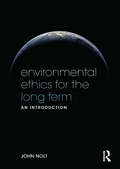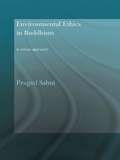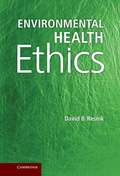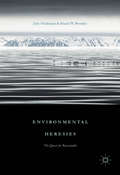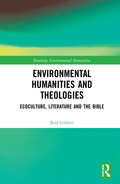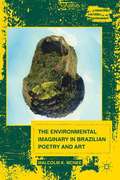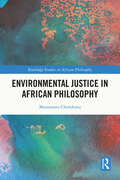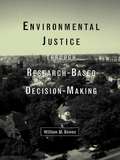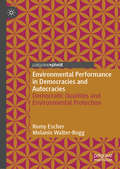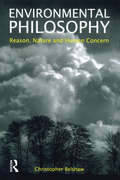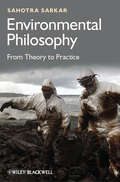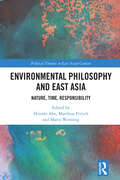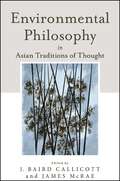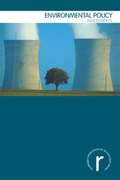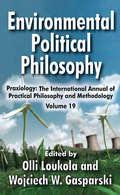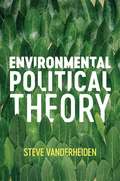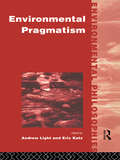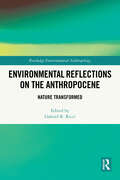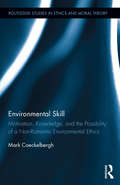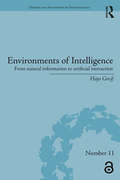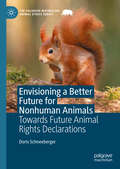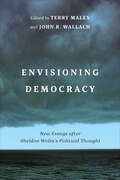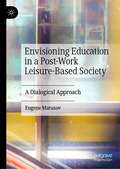- Table View
- List View
Environmental Ethics for the Long Term: An Introduction
by John NoltBroad in scope, this introduction to environmental ethics considers both contemporary issues and the extent of humanity's responsibility for distant future life. John Nolt, a logician and environmental ethicist, interweaves contemporary science, logical analysis, and ethical theory into the story of the expansion of ethics beyond the human species and into the far future. Informed by contemporary environmental science, the book deduces concrete policy recommendations from carefully justified ethical principles and ends with speculations concerning the deepest problems of environmental ethics. Pedagogical features include chapter outlines, annotated suggestions for further readings, the explanations of key terms when first mentioned, and an extensive glossary.
Environmental Ethics in Buddhism: A Virtues Approach (Routledge Critical Studies in Buddhism)
by Pragati SahniEnvironmental Ethics in Buddhism presents a logical and thorough examination of the metaphysical and ethical dimensions of early Buddhist literature. The author determines the meaning of nature in the early Buddhist context from general Buddhist teachings on dhamma, paticcasamuppada, samsara and the cosmogony of the Agganna Sutta. Consequently, the author shows that early Buddhism can be understood as an environmental virtue ethics. To illustrate this dimension, the Jatakas are used as a source. These are a collection of over five hundred folk tales, which also belong to early Buddhist literature. This work gives an innovative approach to the subject, which puts forward a distinctly Buddhist environmental ethics that is in harmony with traditional teachings as well as adaptable and flexible in addressing environmental problems.
Environmental Health Ethics
by David B. ResnikEnvironmental Health Ethics illuminates the conflicts between protecting the environment and promoting human health. In this study, David B. Resnik develops a method for making ethical decisions on environmental health issues. He applies this method to various issues, including pesticide use, antibiotic resistance, nutrition policy, vegetarianism, urban development, occupational safety, disaster preparedness and global climate change. Resnik provides readers with the scientific and technical background necessary to understand these issues. He explains that environmental health controversies cannot simply be reduced to humanity versus environment and explores the ways in which human values and concerns - health, economic development, rights and justice - interact with environmental protection.
Environmental Heresies
by Juha Hiedanpää Daniel W. BromleyThis book systematically deconstructs the pervasive and counter-productive discourse surrounding environmental policy. The authors argue that environmental policy problems are always framed such that conflict is inevitable--a particular project or policy must be accepted versus a specific environmental asset that must be protected. Over the course of 12 chapters, the authors demonstrate that confident yet contradictory assertions by contending interests preclude necessary deliberation and reason giving. They argue that deliberation is an important social process of reflecting upon the reasons for doing something. Their innovative approach allows discourse and collaboration to continue, until--after honest and informed deliberation--the better way forward is arrived at. This approach to environmental policy illustrates just how very constructive and enabling the quest for the reasonable can be.
Environmental Humanities and Theologies: Ecoculture, Literature and the Bible (Routledge Environmental Humanities)
by Rod GiblettMany ways of thinking about and living with ‘the environment’ have their roots in the Bible and the Christian cultural tradition. Environmental Humanities and Theologies shows that some of these ways are problematic. It also provides alternative ways that value both materiality and spirituality. Beginning with an environmentally friendly reading of the biblical story of creation, Environmental Humanities and Theologies goes on to discuss in succeeding chapters the environmental theology of wetlands, dragons and watery monsters (including crocodiles and alligators) in the Bible and literature. It then gives a critical reading of the environmental theology of the biblical book of Psalms. Theological concepts are found in the works of English writers of detective and devotional stories and novels, American nature writers and European Jewish writers (as succeeding chapters show). Environmental Humanities and Theologies concludes with an appreciation for Australian Aboriginal spirituality in the swamp serpent. It argues for the sacrality of marsh monsters and swamp serpents as figures of reverence and respect for living bio- and psycho-symbiotic livelihoods in bioregions of the living earth in the Symbiocene. This is the hoped-for age superseding the Anthropocene. Environmental Humanities and Theologies is aimed at those who have little or no knowledge of how theology underlies much thinking and writing about ‘the environment’ and who are looking for ways of thinking about, being and living with the earth that respect and value both spirituality and materiality. It is a new text nurturing sacrality for the Symbiocene.
The Environmental Imaginary In Brazilian Poetry And Art
by Malcolm K. McneeThis study contributes to ongoing discussions on the connections between the environmental imaginary and issues of identity, place and nation. Utilizing a delimited ecocritical approach, McNee puts Brazilian culture, through the work of contemporary poets and visual artists, into a broader, transnational dialogue.
Environmental Justice in African Philosophy (Routledge Studies in African Philosophy)
by Munamato ChemhuruThis book focuses on environmental justice in African philosophy, highlighting important new perspectives which will be of significance to researchers with an interest in environmental ethics both within Africa and beyond. Drawing on African social and ethical conceptions of existence, the book makes suggestions for how to derive environmental justice from African philosophies such as communitarian ethics, relational ethics, unhu/ubuntu ethics, ecofeminist ethics and intergenerational ethics. Specifically, the book emphasises the ways in which African philosophies of existence seek to involve everyone in environmental policy and planning and to equitably distribute both environmental benefits (such as natural resources) and environmental burdens (such as pollution and the location of mining, industrial or dumping sites). This extends to fair distribution between global South and global North, rich and poor, urban and rural populations, men and women and adults and children. These principles of humaneness, relationships, equality, interconnectedness and teleologically oriented existence among all beings are important not only to African environmental justice but also to the environmental justice movement globally. The book will interest researchers and students working in the fields of environmental ethics, African philosophy and political philosophy in general.
Environmental Justice Through Research-Based Decision-Making (Routledge Research in Public Administration and Public Policy)
by William M. BowenThis book discusses whether and to what extent there are widespread injustices and inequities caused by the distribution of environmental hazards in America today.
Environmental Law and Contrasting Ideas of Nature
by Keith H. HirokawaLaw's ideas of nature appear in different doctrinal and institutional settings, historical periods, and political dialogues. Nature underlies every behavior, contract, or form of wealth, and in this broad sense influences every instance of market transaction or governmental intervention. Recognizing that law has embedded discrete constructions of nature helps in understanding how humans value their relationship with nature. This book offers a scholarly examination of the manner in which nature is constructed through law, both in the 'hard' sense of directly regulating human activities that impact nature, and in the 'soft' manner in which law's ideas of nature influence and are influenced by behaviors, values, and priorities. Traditional accounts of the intersection between law and nature generally focus on environmental laws that protect wilderness. This book will build on the constructivist observation that when considered as a culturally contingent concept, 'nature' is a self-perpetuating and self-reinforcing social creation.
Environmental Performance in Democracies and Autocracies: Democratic Qualities and Environmental Protection
by Romy Escher Melanie Walter-RoggThere are considerable differences in environmental performance and outcomes across both democracies and autocracies, but there is little understanding of how levels of democracy and autocracy influence environmental performance. This book examines whether analysing the effects of individual democratic features separately can contribute to a better understanding of cross-national variance in environmental performance. The authors show that levels of social equality in particular, as well as the strength of local and regional democracy, contribute significantly to explaining cross-national variation in environmental performance. On the other hand, a high level of political corruption affects a country’s ability to adopt and implement environmental policies effectively. In exploring the inter-relationship between democratic qualities, political corruption, and environmental performance, this book presents policymakers and political theorists with a clear picture of which aspects of democratic societies are most conducive to producing a better environment.
Environmental Philosophy: Reason, Nature and Human Concern
by Christopher BelshawThis introduction to the philosophy of the environment examines current debates on how we should think about the natural world and our place within it. The subject is examined from a determinedly analytic philosophical perspective, focusing on questions of value, but taking in attendant issues in epistemology and metaphysics as well. The book begins by considering the nature, extent and origin of the environmental problems with which we need to be concerned. Chapters go on to consider familiar strategies for dealing with environmental problems, and then consider what sort of things are of direct moral concern, examining in turn at animals, non-sentient life-forms, natural but non-living things and deep ecology. The final part of the book investigates notions of value, natural beauty and the place of human beings in the scheme of things.
Environmental Philosophy: From Theory to Practice (Cambridge Studies In Philosophy And Biology Ser.)
by Sahotra SarkarThe first comprehensive treatment of environmental philosophy, going beyond ethics to address the philosophical concepts that underlie environmental thinking and policy-making today Encompasses all of environmental philosophy, including conservation biology, restoration ecology, sustainability, environmental justice, and more Offers the first treatment of decision theory in an environmental philosophy text Explores the conceptions of nature and ethical presuppositions that underlie contemporary environmental debates, and, moving from theory to practice, shows how decision theory translates to public policy Addresses both hot-button issues, including population and immigration reform, and such ongoing issues as historical legacies and nations' responsibility and obligation for environmental problems Anchors philosophical concepts to their practical applications, establishing the priority of the discipline's real-world importance
Environmental Philosophy and East Asia: Nature, Time, Responsibility (Political Theories in East Asian Context)
by Hiroshi Abe Matthias Fritsch Mario WenningThis book explores the contributions of East Asian traditions, particularly Buddhism and Daoism, to environmental philosophy in dialogue with European philosophy. It critically examines the conceptions of human responsibility toward nature and across time presented within these traditions.The volume rethinks human relationships to the natural world by focusing on three main themes: Daoist and Eurodaoist perspectives on nature, human responsibility toward nature, and Buddhist perspectives on life and nature. By way of discussing East Asian traditions and European thinkers, this collection reveals that the impact of humanity on the environment is shaped not only by distinctive modes of economic production, but also by cultural beliefs and practices. Representing a unique constellation of environmental and intercultural philosophy, the contributions present systematic approaches to the global need for cultivating environmental responsibility across cultures and generations to address the political, ethical, and aesthetic challenges arising from humanity’s transformative impact on the natural world.Presenting a critical re-evaluation of human relationships to the natural world in dialogue with East Asian traditions, this will be a valuable resource for students and scholars of Philosophy, Environmental Studies and Asian Studies.
Environmental Philosophy in Asian Traditions of Thought
by J. Baird Callicott James McRaeEnvironmental Philosophy in Asian Traditions of Thought provides a welcome sequel to the foundational volume in Asian environmental ethics Nature in Asian Traditions of Thought. That volume, edited by J. Baird Callicott and Roger T. Ames and published in 1989, inaugurated comparative environmental ethics, adding Asian thought on the natural world to the developing field of environmental philosophy. This new book, edited by Callicott and James McRae, includes some of the best articles in environmental philosophy from the perspective of Asian thought written more recently, some of which appear in print for the first time.Leading scholars draw from the Indian, Chinese, and Japanese traditions of thought to provide a normative ethical framework that can address the environmental challenges being faced in the twenty-first century. Hindu, Buddhist, Confucian, and Daoist approaches are considered along with those of Zen, Japanese Confucianism, and the contemporary philosophy of the Kyoto School. An investigation of environmental philosophy in these Asian traditions not only challenges Western assumptions, but also provides an understanding of Asian philosophy, religion, and culture that informs contemporary environmental law and policy.
Environmental Policy (Routledge Introductions to Environment: Environment and Society Texts)
by Jane RobertsWithin the overall context of sustainable development Environmental Policy discusses the opportunities and constraints that environmental systems place upon the operation of human systems. It suggests environmental policy is a potential way to modify the operation of human systems so that they function within environmental constraints. Key social scientific concepts (political, social and economic) are used to explain the background for the formulation and implementation of environmental policy.Environmental problems, the role of humans in creating them, sustainable development and how this concept relates to environmental policy are all introduced. The book then considers environmental policy formulation, implementation and evaluation, within three specific contexts: the firm, the nation state and at the international level. It also reviews the place of economics, science and technology in environmental policy.Detailed case-studies, drawn from a range of international examples, are used throughout to illustrate issues such as global warming, international trade, tourism and the human rights of indigenous peoples. It is well illustrated and includes end of chapter summaries and further reading.
Environmental Political Philosophy (Praxiology Ser.)
by Wojciech W. GasparskiThe need for solutions to environmental problems is urgent. Expanded environmental research and knowledge, along with interest in environmental issues, has focused attention on the social, political, and practical aspects of environmental problems. Environmental Political Philosophy searches for common environmental goals, values, and policies in society.An essential undercurrent in political theory about the environment is that such issues are not questions of efficiency or technology. They cannot simply be addressed through knowledge of processes and mechanics of nature, by boosting or targeting research, or by allocating of resources and development of technology. Neither can they be resolved solely by increasing civic understanding and mounting environmental campaigns or requiring endless eco-friendly actions.A crucial element of environmental political philosophy is highlighted through the studies in this volume, which address the question of what constitutes efficient action or effective decision making. Praxiology commences with empirical orientation, but does so by maintaining the important sense that in the evaluation of actions and policies, ethical considerations must be employed in conjunction with effectiveness and efficiency.
Environmental Political Theory
by Steve VanderheidenOur politics is intimately linked to the environmental conditions - and crises - of our time. The challenges of sustainability and the discovery of ecological limits to growth are transforming how we understand the core concepts at the heart of political theory. In this essential new textbook, leading political theorist Steve Vanderheiden examines how the concept of sustainability challenges – and is challenged – by eight key social and political ideas, ranging from freedom and equality to democracy and sovereignty. He shows that environmental change will disrupt some of our most cherished ideals, requiring new indicators of progress, new forms of community, and new conceptions of agency and responsibility. He draws on canonical texts, contemporary approaches to environmental political theory, and vivid examples to illustrate how changes in our conceptualization of our social aspirations can inhibit or enable a transition to a just and sustainable society. Vanderheiden masterfully balances crystal clear explanation of the essentials with cutting-edge analysis to produce a book that will be core reading for students of environmental and green political theory everywhere.
Environmental Practice and Early American Literature
by Michael ZiserThis original and provocative study tells the story of American literary history from the perspective of its environmental context. Weaving together close readings of early American texts with ecological histories of tobacco, potatoes, apples, and honey bees, Michael Ziser presents a method for literary criticism that explodes the conceptual distinction between the civilized and natural world. Beginning with the English exploration of Virginia in the sixteenth century, Ziser argues that the settlement of the "New World" - and the cultivation and exploitation of its bounty - dramatically altered how writers used language to describe the phenomena they encountered on the frontier. Examining the work of Harriot, Grainger, Cooper, Thoreau and others, Ziser reveals how these authors, whether consciously or not, transcribed the vibrant ecology of North America, and the ways that the environment helped codify a uniquely American literary aesthetic of lasting importance.
Environmental Pragmatism (Environmental Philosophies)
by Andrew Light Eric KatzEnvironmental pragmatism is a new strategy in environmental thought. It argues that theoretical debates are hindering the ability of the environmental movement to forge agreement on basic policy imperatives. This new direction in environmental thought moves beyond theory, advocating a serious inquiry into the merits of moral pluralism. Environmental pragmatism, as a coherent philosophical position, connects the methodology of classical American pragmatic thought to the explanation, solution and discussion of real issues. This concise, well-focused collection is the first comprehensive presentation of environmental pragmatism as a new philosophical approach to environmental thought and policy.
Environmental Reflections on the Anthropocene: Nature Transformed (Routledge Environmental Anthropology)
by Gabriel R. RicciIncorporating the intellectual history of disciplines from across the humanities, including environmental anthropology, philosophy, ethics, literature, history, science and technology studies, this volume provides a select orientation to the experience of nature from the ancient world to the Anthropocene.Taking its momentum from the emerging environmental humanities, this collection integrates Western, Indigenous, postcolonial, feminist and eco-spiritual perspectives that address pressing environmental concerns and reimagine the place of humans within the natural world. Across thirteen chapters, the contributors discuss the blending of environmental concerns with political and moral questions and encourage collaborative methods across disciplines to address dialectical tensions between culture and nature. They draw on a wide range of critical perspectives, provide a historical framework and speak to global environmental pressures from multiple standpoints. The global approach adopted throughout highlights the various realities of the growing ecological crisis experienced across the world. Written to appeal to a broad range of readers across the environmental humanities, this edited book will be particularly useful to academics, scholars and researchers in philosophy, anthropology, literature, history and critical theory.
Environmental Skill: Motivation, Knowledge, and the Possibility of a Non-Romantic Environmental Ethics (Routledge Studies in Ethics and Moral Theory)
by Mark CoeckelberghToday it is widely recognized that we face urgent and serious environmental problems and we know much about them, yet we do very little. What explains this lack of motivation and change? Why is it so hard to change our lives? This book addresses this question by means of a philosophical inquiry into the conditions of possibility for environmental change. It discusses how we can become more motivated to do environmental good and what kind of knowledge we need for this, and explores the relations between motivation, knowledge, and modernity. After reviewing a broad range of possible philosophical and psychological responses to environmental apathy and inertia, the author argues for moving away from a modern focus on either detached reason and control (Stoicism and Enlightenment reason) or the natural, the sentiments, and the authentic (Romanticism), both of which make possible disengaging and alienating modes of relating to our environment. Instead he develops the notion of environmental skill: a concept that bridges the gap between knowledge and action, re-interprets environmental virtue, and suggests an environmental ethics centered on experience, know-how and skillful engagement with our environment. The author then explores the implications of this ethics for our lives: it changes the way we think about , and deal with, health, food, animals, energy, climate change, politics, and technology.
Environments of Intelligence: From natural information to artificial interaction (History and Philosophy of Technoscience)
by Hajo GreifWhat is the role of the environment, and of the information it provides, in cognition? More specifically, may there be a role for certain artefacts to play in this context? These are questions that motivate "4E" theories of cognition (as being embodied, embedded, extended, enactive). In his take on that family of views, Hajo Greif first defends and refines a concept of information as primarily natural, environmentally embedded in character, which had been eclipsed by information-processing views of cognition. He continues with an inquiry into the cognitive bearing of some artefacts that are sometimes referred to as 'intelligent environments'. Without necessarily having much to do with Artificial Intelligence, such artefacts may ultimately modify our informational environments. With respect to human cognition, the most notable effect of digital computers is not that they might be able, or become able, to think but that they alter the way we perceive, think and act. The Open Access version of this book, available at http://www.tandfebooks.com/doi/view/10.4324/9781315401867, has been made available under a Creative Commons CC-BY licence
Envisioning a Better Future for Nonhuman Animals: Towards Future Animal Rights Declarations (The Palgrave Macmillan Animal Ethics Series)
by Doris SchneebergerThis book presents an ethical discussion of the possible future Universal Declarations of (diverse specific nonhuman) Animal Rights. It contributes to a basis for a discussion about (nonhuman) animal rights concerning diverse aspects and quality of (nonhuman) animal life. Doris Schneeberger deals with the interpretation and justification of animal rights, and argues that because (nonhuman) animals are individuals whose lives are intrinsically and inherently valuable, their goods and welfare ought to be protected. She claims that these rights should be protected in possible morally advanced societies of the future.
Envisioning Democracy: New Essays after Sheldon Wolin’s Political Thought
by Terry Maley John R. WallachFew terms elicit such strong and varied feelings and yet have so little clarity as "democracy." Leaders of large states use "democracy" to designate their nations’ public character even as critics and rivals use the term to validate their own political perspectives. In Envisioning Democracy, the editors and contributors address the following questions: What does democracy mean today? What could it mean tomorrow? What is the dynamic of democracy in an increasingly interdependent world? Envisioning Democracy explores these questions amid the dynamic of democracy as a political phenomenon interacting with forms of economic, ethical, ethnic, and intellectual life. The book draws on the work of Sheldon S. Wolin (1922–2015), one of the most influential American theorists of the last fifty years. Here, scholars consider the historical conditions, theoretical elements, and practical impediments to democracy, using Wolin’s insights as touchstones in thinking through the possibilities and obstacles facing democracy now and in the future.
Envisioning Education in a Post-Work Leisure-Based Society: A Dialogical Approach
by Eugene MatusovThis book is both an analytic and imaginative study of the future role of education in a leisure-based society. Grounded in a philosophical approach that draws on the work of Aristotle, Arendt, Keynes, and others, the volume deconstructs modern work-based society, as well as mainstream institutionalized education, which the author argues have systemically alienated students from their education, authorial agency, and society itself. The author argues for the value of intrinsic education, where the goals are based on students' own needs and interests, imagining new opportunities that can arise from the emergence of such a society.
